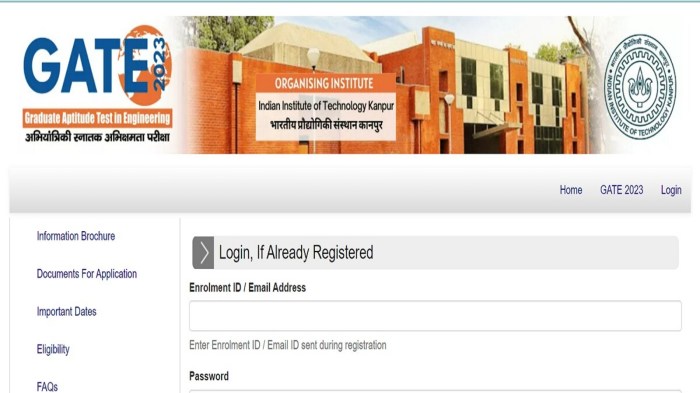7 Steps to Apply for Scholarships in Competitive Fields sets the stage for this enthralling narrative, offering readers a glimpse into a story that is rich in detail with kompas author style and brimming with originality from the outset.
Scholarships in competitive fields open doors to opportunities, but the path to securing them is filled with challenges. This guide navigates through the intricate process, providing valuable insights and strategies to help you stand out in your pursuit of scholarship success.
Overview of Scholarships in Competitive Fields

Scholarships in competitive fields play a crucial role in providing financial support to students pursuing education in areas where the competition is intense and the stakes are high. These scholarships recognize and reward academic excellence, innovative research, and exceptional talent in various fields of study.
Are you a music or performing arts major looking for financial aid? Check out these 8 Scholarships for Music and Performing Arts Majors that can help fund your education and support your artistic endeavors.
Importance of Scholarships in Competitive Fields
Scholarships offer students the opportunity to distinguish themselves from their peers by showcasing their skills, achievements, and dedication to their chosen field. In competitive fields, where success often hinges on access to resources and opportunities, scholarships can level the playing field and enable talented individuals to pursue their academic and professional goals.
Don’t let financial need hold you back from pursuing your dreams. Explore these 8 Scholarships Without Financial Need Requirements that are available for students regardless of their financial situation.
Examples of Competitive Fields for Scholarships
- STEM (Science, Technology, Engineering, and Mathematics): Scholarships in STEM fields are highly sought after due to the demand for skilled professionals in areas such as cybersecurity, artificial intelligence, and biotechnology.
- Medicine and Healthcare: With the rising importance of healthcare services, scholarships in medical fields, nursing, and public health are competitive and essential for attracting top talent.
- Business and Finance: Scholarships for business students specializing in finance, entrepreneurship, or management are competitive as they support future leaders and innovators in the corporate world.
Researching Scholarship Opportunities
When it comes to applying for scholarships in competitive fields, conducting thorough research is crucial to increase your chances of success. By exploring various scholarship opportunities, understanding eligibility criteria, and finding niche scholarships, you can maximize your chances of securing financial aid for your education.
Understanding Eligibility Criteria
Before applying for scholarships in competitive fields, it is essential to carefully review and understand the eligibility criteria set by each scholarship provider. This can include academic requirements, field of study, extracurricular activities, community service, and more. By ensuring that you meet all the criteria, you can avoid wasting time on scholarships for which you are not eligible.
Finding Niche Scholarships
One strategy to stand out in competitive fields is to search for niche scholarships that are specific to your area of interest or expertise. These scholarships may have less competition compared to broader scholarships, increasing your chances of being selected as a recipient. Consider looking for scholarships related to your major, career goals, cultural background, or unique talents to find opportunities that align with your profile.
Building a Strong Scholarship Application

When it comes to applying for scholarships in competitive fields, having a strong application can make all the difference in standing out among other applicants. This requires careful attention to detail and a tailored approach based on the specific requirements of each scholarship.
Key Components of a Strong Scholarship Application
- Well-crafted Personal Statement: A compelling personal statement that highlights your achievements, goals, and passion for the field can set you apart from other candidates.
- Letters of Recommendation: Strong letters of recommendation from professors, mentors, or employers who can attest to your abilities and character are crucial in showcasing your qualifications.
- Academic Transcripts: Providing transcripts that demonstrate your academic excellence and relevant coursework can strengthen your application.
- Resume/CV: A well-organized resume or curriculum vitae that Artikels your education, work experience, and extracurricular activities can give scholarship committees a comprehensive view of your qualifications.
- Essays or Writing Samples: Submitting thoughtful and well-written essays or writing samples that address specific prompts or topics required by the scholarship can showcase your communication skills and critical thinking abilities.
Tailoring Application Materials to Specific Competitive Fields
When applying for scholarships in competitive fields, it’s essential to tailor your application materials to align with the expectations and preferences of the selection committee. This can involve researching the values and priorities of the scholarship providers and customizing your application to reflect how your goals and accomplishments align with their mission.
Successful Scholarship Application Strategies
- Start Early: Begin researching and preparing your scholarship applications well in advance to ensure you have enough time to gather materials, revise essays, and request letters of recommendation.
- Focus on Quality: Rather than applying to numerous scholarships with generic materials, focus on a select few that align with your interests and qualifications, and dedicate time to perfecting each application.
- Seek Feedback: Have trusted mentors, teachers, or peers review your application materials to provide feedback and suggestions for improvement before submitting them.
- Be Authentic: Stay true to yourself and your experiences in your application materials, as authenticity can resonate with scholarship committees and set you apart from applicants who may exaggerate or misrepresent their qualifications.
Crafting a Compelling Personal Statement: 7 Steps To Apply For Scholarships In Competitive Fields

When it comes to scholarship applications in competitive fields, a compelling personal statement can be the key factor that sets you apart from other applicants. This is your opportunity to showcase your unique qualities, experiences, and goals to the selection committee.
First-generation college students can access these 5 Scholarships for First-Generation College Students to assist them in navigating the challenges of higher education and building a successful future.
Importance of a Compelling Personal Statement
A well-crafted personal statement provides insight into who you are as a person, beyond your academic achievements and qualifications. It allows you to communicate your passion, motivation, and future aspirations, giving the committee a deeper understanding of your character and potential.
Are you a low-income student dreaming of studying abroad? Look into these 10 Scholarships for Low-Income Students to Study Abroad that can make your international education goals a reality.
- Highlight your achievements and experiences that align with the scholarship’s objectives.
- Showcase your unique qualities, skills, and values that make you a deserving candidate.
- Demonstrate your passion for the field of study and your commitment to making a difference.
Tips for Crafting an Effective Personal Statement
- Start with a compelling introduction that grabs the reader’s attention and sets the tone for the rest of the statement.
- Be authentic and genuine in your writing, sharing personal anecdotes and reflections that showcase your personality.
- Focus on specific examples to support your claims and demonstrate the impact of your actions and experiences.
- Tailor your statement to the scholarship requirements and objectives, showing how you are the ideal candidate for the award.
Examples of Impactful Personal Statements
“Growing up in a low-income community inspired me to pursue a career in public health, where I aim to address disparities and improve access to healthcare for underserved populations.”
“My research on sustainable energy solutions led me to develop a passion for environmental conservation, driving my determination to create a more sustainable future through innovative technologies.”
BIPOC students interested in law degrees can find support through these 10 Scholarships for BIPOC Students Pursuing Law Degrees to help them achieve their academic and professional goals.
Securing Strong Letters of Recommendation
Securing strong letters of recommendation is a crucial component of scholarship applications in competitive fields. These letters provide insight into the applicant’s character, accomplishments, and potential for success, offering a personalized perspective that complements the rest of the application.
Choosing the Right Recommenders
When selecting recommenders for scholarships in competitive fields, it is essential to choose individuals who can speak to your academic abilities, work ethic, and potential for success in the specific field of study. Opt for professors, supervisors, or mentors who know you well and can provide detailed and positive accounts of your qualifications.
- Consider individuals who have observed your academic or professional growth firsthand.
- Choose recommenders who can speak to your skills and accomplishments relevant to the scholarship criteria.
- Avoid selecting recommenders solely based on their title or position; focus on those who can provide a genuine and impactful recommendation.
Requesting and Obtaining Compelling Letters of Recommendation
When requesting letters of recommendation, it is crucial to approach potential recommenders professionally and provide them with all necessary information to craft a strong letter on your behalf.
- Reach out to recommenders well in advance, allowing them sufficient time to write a thoughtful letter.
- Provide recommenders with details about the scholarship, including the deadline, criteria, and any specific points you would like them to address.
- Offer to schedule a meeting or provide additional information to help recommenders personalize the letter and highlight your strengths effectively.
- Follow up with recommenders to ensure they have submitted the letter on time and express gratitude for their support.
Standing Out in Scholarship Interviews

Preparing for scholarship interviews in competitive fields is crucial to set yourself apart from other candidates. Here are some tips to help you shine during your scholarship interview:
Common Questions and Effective Answers
- Be prepared to discuss your academic and extracurricular achievements, as well as your future goals. Provide concrete examples to support your answers.
- Practice answering questions about your strengths and weaknesses, highlighting how you have worked to improve in areas of weakness.
- Be ready to talk about how you have overcome challenges or obstacles in your academic or personal life, demonstrating resilience and determination.
- Showcase your passion for your field of study and your commitment to making a positive impact in the future.
Strategies for Showcasing Skills and Accomplishments
During the interview, focus on highlighting specific accomplishments that align with the values and goals of the scholarship organization. Use storytelling techniques to make your experiences come to life and leave a lasting impression on the interviewers.
- Emphasize leadership roles you have taken on, projects you have successfully completed, and any research or volunteer work that showcases your dedication and skills.
- Discuss how you plan to use the scholarship opportunities to further your education and achieve your long-term career goals.
- Show gratitude for the opportunity to interview and convey your enthusiasm for the scholarship program.
Following Up and Reflecting on the Scholarship Application Process

After submitting scholarship applications, it is crucial to follow up on the progress to ensure that all materials have been received and to show continued interest in the scholarship. Following up can help clarify any doubts or provide additional information that may strengthen your application.
Importance of Following Up
Following up after submitting scholarship applications demonstrates your commitment and eagerness to receive the scholarship. It also allows you to address any potential issues or missing documents promptly, increasing your chances of being considered for the award.
Tips for Reflecting on the Application Process
- Review your application materials: Take a critical look at your application to identify areas for improvement and learn from any mistakes.
- Evaluate feedback: If you received feedback on your application, use it constructively to enhance future applications.
- Assess your strengths and weaknesses: Reflect on what sets you apart from other applicants and work on areas that need improvement.
Staying Motivated to Apply for Scholarships, 7 Steps to Apply for Scholarships in Competitive Fields
Applying for scholarships in competitive fields can be challenging, but staying motivated is essential to increase your chances of success. Here are some tips to keep you motivated:
- Set realistic goals: Break down the application process into manageable steps to avoid feeling overwhelmed.
- Celebrate small victories: Acknowledge and celebrate each milestone achieved in the application process to stay motivated.
- Seek support: Surround yourself with a supportive network of friends, family, or mentors who can encourage you during the application process.
Embark on your scholarship journey armed with the knowledge gained from the 7 Steps to Apply for Scholarships in Competitive Fields. As you navigate the competitive landscape of scholarship applications, remember that perseverance and strategic planning are key to achieving your academic and career goals.